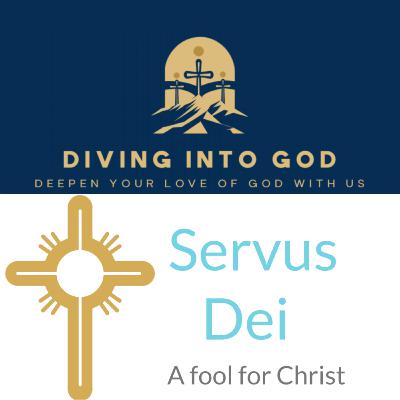Discover Diving into God
Diving into God

Diving into God
Author: Michael Fierro
Subscribed: 2Played: 15Subscribe
Share
© Michael Fierro
Description
A podcast about theological themes from a Catholic perspective.
Explore the depths of the Trinity, Grace, moral theology, sacramental theology, ecclesiology, and scripture.
Deepen your love of God with us. Brought to you by Servus Dei.
Explore the depths of the Trinity, Grace, moral theology, sacramental theology, ecclesiology, and scripture.
Deepen your love of God with us. Brought to you by Servus Dei.
323 Episodes
Reverse
Explores the critical distinction between emotions and deeper spiritual motions for effective discernment, particularly within a Catholic framework. It highlights the imprecision of the term "I feel" and how confusing emotional states with divine promptings can hinder spiritual understanding.
Examines the Genesis account of Adam and Eve's fall, focusing on the misinterpretation of the serpent's promise to "know good and evil."
Explores the demanding nature of true Christian discipleship. It highlights Jesus's teachings that even the deepest human relationships and one's own life must be secondary to devotion to Him.
Galatians chapters 5 and 6, focusing on the concept of Christian freedom. Explains that true liberty in Christ is not an excuse for sin, but rather a call to live by the Spirit and love one another, emphasizing that righteousness comes through faith and not by adherence to the law.
Explores Galatians chapters 3 and 4, focusing on Paul's argument that salvation comes through faith in Christ, not adherence to the law. It emphasizes that Abraham's righteousness was credited to him through faith, establishing a covenant of promise that predates the law.
A Catholic look at Paul's Letter to the Galatians, focusing on its urgent tone and Paul's impassioned defense of the Gospel. It highlights the letter's central themes: justification by grace through faith rather than works of the law, Christian freedom as life in the Spirit, and the transformative power of being "crucified with Christ.
Argues that modern societies are facing a global demographic crisis not due to catastrophe, but by choice. Asserts that declining fertility rates worldwide stem from a philosophical and moral shift, where children are increasingly perceived as burdens rather than blessings
Emphasizes the Christian virtue of humility as a pathway to divine honor and an essential component of faith. It explains that human pride often leads to self-reliance, which goes against Jesus' teachings to take the lowest place and not seek self-exaltation.
Discusses a concerning trend in organ donation, particularly in Kentucky, where organ harvesting allegedly occurred from patients showing signs of consciousness before being declared legally or morally dead.
Explores the challenging nature of upholding truth and integrity when it leads to negative consequences rather than popular acclaim. It highlights that while humans naturally desire affirmation for good deeds, true courage often goes unrecognized or even provokes opposition.
Uses an extended metaphor to explain the human experience of suffering and its relationship to faith. It suggests that life is like a massive painting where individuals only see small, seemingly meaningless "splotches" up close, preventing them from understanding the greater design.
Argues that parenthood extends beyond biological ties, encompassing a deeper spiritual dimension. It emphasizes that true parenthood involves loving, forming, guiding, and sacrificing for others, a role fulfilled by individuals like priests, teachers, and mentors, who share the burden and beauty of spiritual responsibility.
Explores the Christian concept of salvation and the challenges associated with achieving it. Explains that the "narrow gate" represents a difficult path requiring divine love and grace, contrasting it with an easy road leading to destruction. True love, characterized by self-sacrifice and surrender, is presented as essential for entering this path, a love made possible only through Christ's intercession.
Argues that parenthood is a sacred path to holiness, directly contrasting modern societal views that often portray children as burdens or obstacles to personal freedom. Asserts that parenting profoundly transforms individuals, teaching invaluable lessons in selfless love, patience, and sacrifice through everyday challenges like sleepless nights and constant giving.
Argues that modern society has fostered a sense of dislocation by encouraging individuals to detach from traditional structures like family, religion, and community in pursuit of absolute freedom. Posits that this abandonment of commitment has led to a pervasive feeling of isolation and a longing for authentic connection, which digital substitutes cannot fulfill.
Examines the modern cultural emphasis on diversity. While acknowledging the inherent good in celebrating individual uniqueness, it argues that diversity without an overarching sense of unity leads to fragmentation and discord.
Explores the Eucharist as a central pillar of Christian faith. It explains the Eucharist through three primary lenses: as a new covenant sealed by Christ's blood, as a sacrifice that re-presents Christ's singular offering on Calvary, and as a fulfillment of the priesthood of Melchizedek, foreshadowing Christ's eternal role.
Explores the challenges of following God's will in a world often resistant to truth. It draws parallels between the experiences of the prophet Jeremiah and Jesus Christ, both of whom faced rejection and suffering for proclaiming truth.
Explains that Christianity is fundamentally a personal connection with Jesus Christ, rather than merely a set of beliefs or rules. It emphasizes that this relationship involves active participation, where Christ lives within believers and they are united with Him through sacraments like baptism and the Eucharist, as well as through prayer and suffering.
Explains the nature and mission of the Church from a Christian theological perspective. It asserts that the Church is not merely an organization but the "Body of Christ," an extension of Jesus Himself, animated by the Holy Spirit, through which He continues His work in the world.





